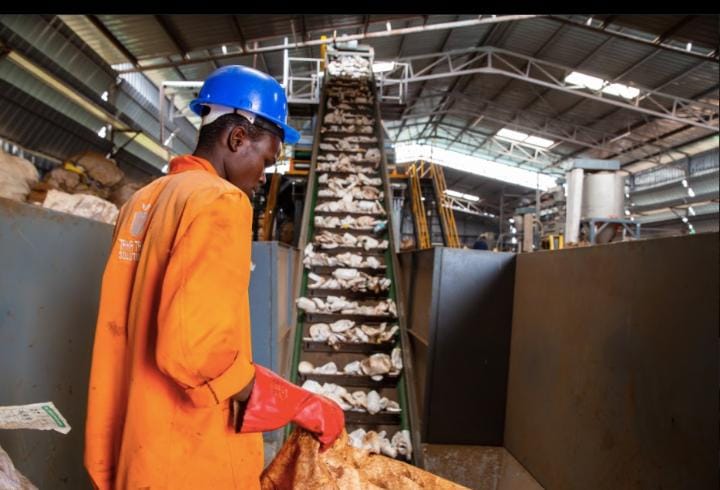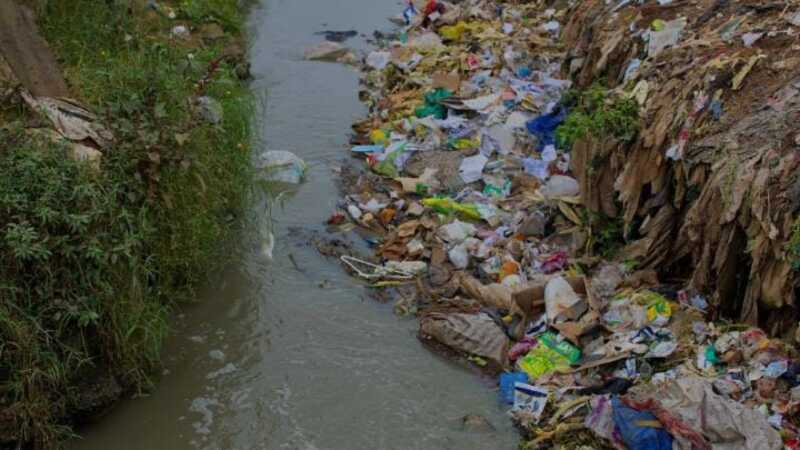Mohamed Suleiman is not your ordinary Kenyan who goes for an 8am to 5pm job daily. While many people put on clean clothes and head to offices or shops each morning, his life takes a very different direction. He struggles every day trying to make ends meet, and each day is a test of survival. Unlike formal workers who wait for salary at the end of the month. Suleiman depends on what he can collect and sell in a single day.
He wakes up every morning at the crack of dawn to start his routine, moving from door to door collecting garbage. Long before the sun rises fully, he is already on the road, carrying a sack on his back and gloves on his hands. The streets are quiet while most people are still asleep, he begins his wok. Some days the bag is light, on others he carries heavy bags filled with all kind of waste.
What is different with his work though is that Suleiman’s eye is focused on plastic since it has value.
‘’Every morning, I wake up early and start moving from house to house. Some people don’t even know where their trash goes, but for us, this is how we earn our daily bread. When I collect the waste, I try to separate plastics from food remains because I know plastics can be recycled. It’s not an easy job. Sometimes people don’t want to pay, or they mix everything together but at least I know I’m helping keep the community clean. If we had more support, even training, we could do this work better and also protect our environment. Says Suleiman Mohamed one of door to door collector around Likoni.
Suleiman’s story is not about survival. It is also a picture of the much bigger problem that affects the world today. Plastic waste is now a danger across the world. Every year, more than 400 million tonnes of plastic are produced, alot of it ends up in our homes, on the streets, in rivers and the food we eat. yet less than 10 percent is recycled. The rest ends up polluting land, rivers, and oceans.
According to the Kenya Plastics Pact Roadmap to 2030, the country produces between 0.5 and 1.3 million tonnes of plastic waste annually, but only 8% is recycled. Of all plastic waste generated, just 27% is collected; from that, 8% is recycled, while the rest ends up in dumpsites, landfills or is incinerated.
The effects are visible everywhere, in dumpsites, drainage systems, and even farmlands. Mombasa city with a population of 1.5 million residents, generates around 900 tonnes of waste daily, much of it is plastic. Rivers like Mtopanga are choked with debris, worsening flooding during heavy rains.
Beyond clogged drains and polluted rivers, plastics pose a silent danger to human health. Microplastics, the tiny fragments invisible to the naked eye are now being found in drinking water, fish, and even human blood.
“Microplastics can carry toxic chemicals and heavy metals into the body. Over time, this raises risks of cancers, fertility problems, and respiratory diseases,” says. Ecologist Sharrif Injamu.
In 2017, the Kenyan government made international headlines by banning single-use plastic carrier bags, a move hailed as one of the strictest in the world. In 2020, the ban was extended to cover plastics in national parks, forests, and beaches. The United Nations described Kenya’s move as “the world’s strictest plastic bag ban”
While the ban has reduced visible litter in towns and tourist sites, but challenges remain. Plastics still sneak into the market through illegal trade and weak enforcement.
Within this crisis lies opportunity. Many young Kenyans are turning plastic waste into profit. One of the most innovative is Gjenge Makers, a Nairobi-based start-up founded by Nzambi Matee, a materials engineer. The company transforms plastic waste into building bricks that are five times stronger than concrete. Gjenge Makers has won global recognition, including a UN Young Champions of the Earth award, for its contribution to sustainable construction.
Another notable effort’s is TakaTaka Solutions, founded in 2011 with the vision of turning waste into value. Today, the company employs over 300 people directly and supports thousands more indirectly through waste collection networks.
They are able also to collect, sort, and recycle up to 60% of all waste handled daily in Nairobi, including plastics. This came after realising that most waste is dumped or burned. Therefore, they decided to prove that everything can be recycled if sorted properly.
But challenges remain still. Illegal dumping, low awareness, and high logistics costs make recycling expensive. Still, TakaTaka Solutions is addressing these obstacles by investing in door-to-door collection, building sorting centers, and collaborating with communities.
As per Renewable Energy, Energy and Resource Efficiency Promotion in International Cooperation (REPIC (2018)), Sustainable Manufacturing and Environmental Pollution Program (SMEP Programme (2023)), and End Plastic Waste. TakaTaka Solutions plans to expand into Kenyan cities such as Mombasa, Nakuru, and Eldoret, and into Tanzanian towns including Arusha, Tanga, Moshi, Mbeya, and Mwanza. The company also aims to increase its recycling to about 200 tons of waste every day and has started projects to handle hard in recycling plastics. With these steps it is now working to become East Africa’s largest integrated waste management company.
Flexible plastics such as food wrappers and carrier bags make up nearly half of all plastics used in Kenya, but less than 1% is recycled. This shows the scale of untapped potential for innovation.
Experts argue that stronger enforcement of bans, community education, and investment in recycling industries are crucial. Above all, every Kenya has a role to play in reducing, reusing, and recycling plastics.
“Plastic pollution will not be solved by government alone. Every citizen must take responsibility,” stresses Injamu, who campaigns against plastic waste along Kenya’s coast. “If we reduce at the source, reuse what we can, and recycle effectively, Kenya can lead Africa in beating plastic pollution.”
Plastic waste may be one of the greatest challenges of our time, but with bold policies, youth innovation, and collective community action, Kenya can build a cleaner and greener future.


